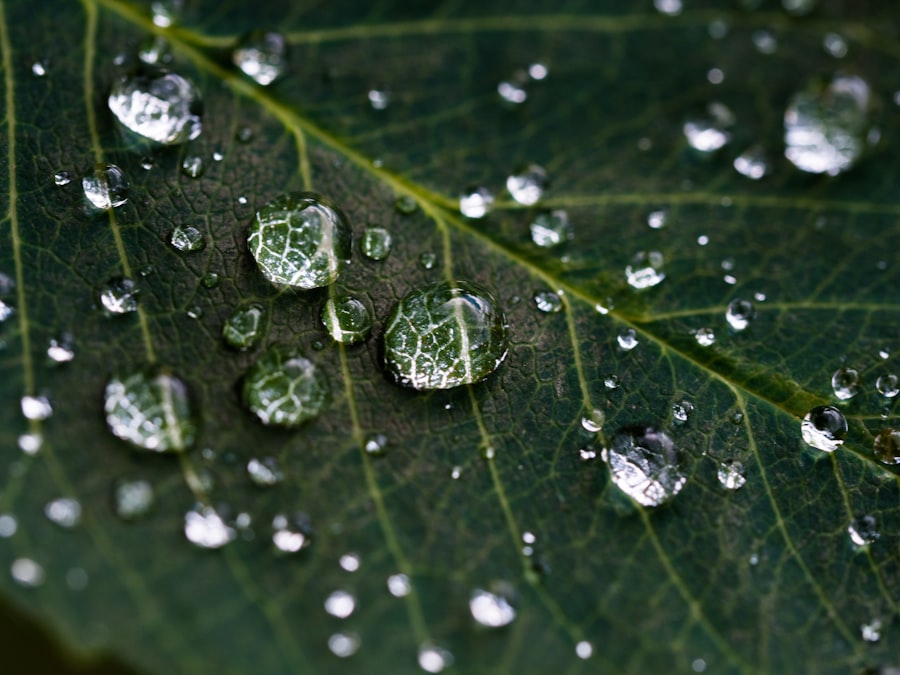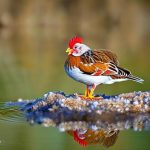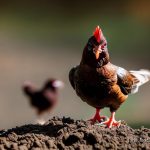Keeping chickens’ water from freezing during the winter months is crucial for their health and well-being. Access to water is essential for chickens as it helps with digestion, regulates body temperature, and keeps them hydrated. In cold weather, it becomes even more important to ensure that chickens have access to unfrozen water as dehydration can have negative effects on their overall health. In this article, we will discuss the importance of keeping chickens’ water from freezing, factors to consider when choosing a waterer, the best types of waterers for preventing freezing, insulating your chicken coop, heating options for chicken coops, tips for preventing water from freezing in extreme cold weather, DIY solutions for preventing water from freezing, and maintenance and cleaning of waterers during winter months.
Key Takeaways
- Keeping chickens’ water from freezing is crucial for their health and survival during winter months.
- Factors to consider when choosing a waterer include size, material, and ease of cleaning.
- The best types of waterers for preventing freezing are heated, insulated, or both.
- Insulating your chicken coop and using heating options can also help prevent water from freezing.
- Regular maintenance and cleaning of waterers is important to ensure access to water all winter long.
Why is it important to keep chickens’ water from freezing?
It is important to keep chickens’ water from freezing because dehydration can have negative effects on their health. Chickens need access to water to aid in digestion and nutrient absorption. Water also helps regulate their body temperature, especially during extreme weather conditions. When chickens don’t have access to water, they can become dehydrated, which can lead to decreased egg production, poor growth, and even death.
In addition to dehydration, there are risks associated with chickens drinking from snow or ice. Snow and ice can be contaminated with bacteria and other pathogens that can cause illness in chickens. By providing unfrozen water, you can ensure that your chickens are getting clean and safe drinking water.
Factors to consider when choosing a waterer
When choosing a waterer for your chickens, there are several factors to consider. The size of your flock will determine the size of the waterer you need. You want to make sure that all your chickens have access to water without overcrowding around the waterer.
Climate and temperature are also important factors to consider. If you live in an area with extremely cold temperatures, you will need a waterer that can withstand freezing temperatures and prevent the water from freezing. Some waterers come with built-in heating elements or insulation to prevent freezing.
Ease of use and maintenance is another factor to consider. You want a waterer that is easy to fill and clean. Some waterers have features like automatic refilling or self-cleaning, which can make your life easier.
The best types of waterers for preventing freezing
There are several types of waterers that are effective in preventing freezing. Heated waterers are a popular choice as they have built-in heating elements that keep the water from freezing. These waterers are usually made of durable materials that can withstand cold temperatures.
Insulated waterers are another option for preventing freezing. These waterers have layers of insulation that help maintain the temperature of the water, preventing it from freezing. Insulated waterers are a good choice for areas with moderately cold temperatures.
Automatic waterers are also effective in preventing freezing. These waterers have sensors that detect when the water level is low and automatically refill it. Some automatic waterers also have heating elements or insulation to prevent freezing.
Each type of waterer has its benefits and drawbacks. Heated waterers require electricity and may not be suitable for areas with limited access to power. Insulated waterers may not be as effective in extremely cold temperatures. Automatic waterers can be more expensive and may require more maintenance.
Insulating your chicken coop to prevent freezing
In addition to using a suitable waterer, it is important to insulate your chicken coop to keep the temperature above freezing. Insulation helps retain heat and prevents cold air from entering the coop. This is especially important during the winter months when temperatures can drop significantly.
There are several materials that can be used for insulation, such as straw, hay, or foam boards. Straw and hay can be used to line the walls and floor of the coop, providing an extra layer of insulation. Foam boards can be placed on the walls and ceiling to further insulate the coop.
It is important to ensure that the coop is well-ventilated even with insulation. Proper ventilation helps remove moisture and prevents condensation, which can lead to frostbite and other health issues for the chickens.
Heating options for chicken coops

In addition to insulation, heating options can be used to keep the temperature inside the chicken coop above freezing. Heat lamps are a popular choice as they provide direct heat and can be easily installed in the coop. However, it is important to use heat lamps with caution as they can be a fire hazard if not properly installed or monitored.
Radiant heaters are another option for heating chicken coops. These heaters emit infrared radiation, which warms up objects and surfaces in the coop. Radiant heaters are generally safer than heat lamps as they do not emit open flames.
When using any type of heating option, it is important to monitor the temperature inside the coop and ensure that it does not get too hot. Chickens are sensitive to extreme temperatures, so it is important to provide a comfortable and safe environment for them.
Tips for preventing water from freezing in extreme cold weather
In extreme cold weather, additional measures may need to be taken to prevent water from freezing. Adding salt or sugar to the water can lower its freezing point and prevent it from freezing. However, it is important to use these additives in moderation as excessive amounts can be harmful to chickens.
Frequent checking of waterers is also important during extreme cold weather. Waterers should be checked multiple times a day to ensure that the water is not frozen and that there is enough water for all the chickens.
DIY solutions for preventing water from freezing
If you are looking for DIY solutions to prevent water from freezing, there are several options available. One option is to use a light bulb inside the coop. The heat generated by the light bulb can help keep the water from freezing. However, it is important to use a heat-resistant light bulb and ensure that it is properly installed to prevent any fire hazards.
Another DIY solution is to use a heated rock. This can be done by placing a flat rock on top of a heating pad or using a heated pet mat. The rock will absorb the heat and keep the water from freezing. However, it is important to monitor the temperature of the rock and ensure that it does not get too hot.
Each DIY solution has its benefits and drawbacks. Light bulbs and heated rocks require electricity and may not be suitable for areas with limited access to power. They also require monitoring to ensure that they are functioning properly and not causing any safety hazards.
Maintenance and cleaning of waterers during winter months
During the winter months, it is important to clean waterers regularly to prevent bacteria growth. Bacteria can multiply quickly in stagnant water, which can lead to illness in chickens. Waterers should be emptied, cleaned, and refilled with fresh water on a regular basis.
To prevent waterers from freezing, it is important to insulate them properly. Insulation can help maintain the temperature of the water and prevent freezing. Insulated waterers should be checked regularly to ensure that the insulation is intact and functioning properly.
Ensuring your chickens have access to water all winter long
In conclusion, providing access to unfrozen water for chickens during the winter months is crucial for their health and well-being. Dehydration can have negative effects on chickens’ overall health, so it is important to prevent their water from freezing. Factors such as flock size, climate, and ease of use should be considered when choosing a waterer.
There are different types of waterers available for preventing freezing, including heated, insulated, and automatic waterers. Insulating the chicken coop and using heating options can also help prevent water from freezing. DIY solutions can be used as a temporary measure, but it is important to monitor them closely for safety.
Regular maintenance and cleaning of waterers are important to prevent bacteria growth. Waterers should be checked frequently during extreme cold weather to ensure that the water is not frozen and there is enough water for all the chickens.
By taking these measures, you can ensure that your chickens have access to water all winter long, promoting their health and well-being.
If you’re looking for the best way to keep your chickens’ water from freezing during the winter months, look no further than this informative article on Poultry Wizard. They provide valuable insights and tips on how to prevent your chickens’ water from turning into ice, ensuring that your feathered friends stay hydrated even in the coldest temperatures. Check out the article here for practical solutions to keep your chickens’ water flowing all winter long.
FAQs
What is the best way to keep chickens’ water from freezing?
The best way to keep chickens’ water from freezing is to use a heated waterer or a heated base under the waterer.
What is a heated waterer?
A heated waterer is a device that keeps the water in the chicken’s waterer from freezing by using a heating element.
What is a heated base?
A heated base is a device that keeps the water in the chicken’s waterer from freezing by using a heating element that is placed under the waterer.
How does a heated waterer work?
A heated waterer works by using a heating element to keep the water in the waterer from freezing. The heating element is usually powered by electricity.
How does a heated base work?
A heated base works by using a heating element that is placed under the waterer to keep the water in the waterer from freezing. The heating element is usually powered by electricity.
Are there any other ways to keep chickens’ water from freezing?
Other ways to keep chickens’ water from freezing include using a heated rock or a heated bucket. However, these methods may not be as effective as using a heated waterer or a heated base.
Meet Walter, the feathered-friend fanatic of Florida! Nestled in the sunshine state, Walter struts through life with his feathered companions, clucking his way to happiness. With a coop that’s fancier than a five-star hotel, he’s the Don Juan of the chicken world. When he’s not teaching his hens to do the cha-cha, you’ll find him in a heated debate with his prized rooster, Sir Clucks-a-Lot. Walter’s poultry passion is no yolk; he’s the sunny-side-up guy you never knew you needed in your flock of friends!







